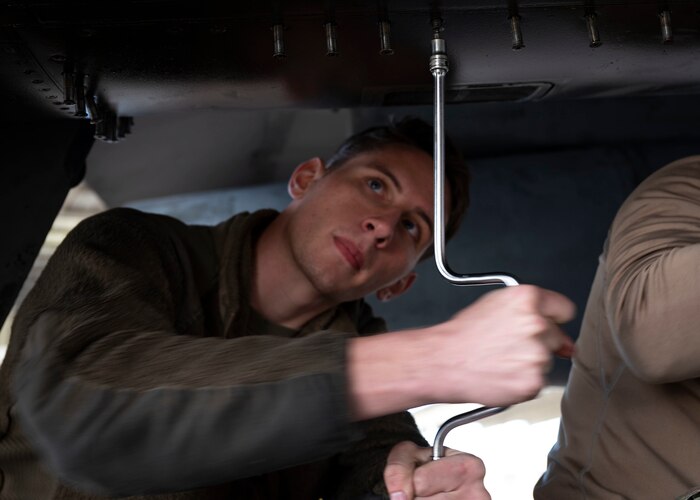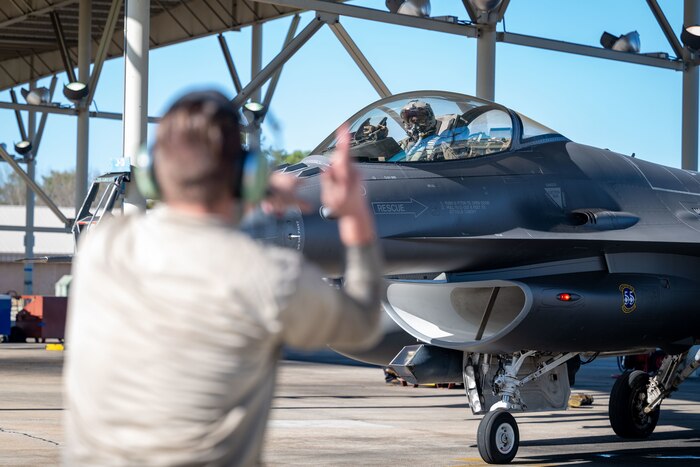SHEPPARD AIR FORCE BASE, Texas -- Mission generation is vital for the projection of air superiority and combat readiness. However, lack of communication between operations, maintenance and logistics can create barriers to optimal performance. The 82nd Training Wing’s newly developed Mission Generation Workshop aims to increase interoperability between the groups.
Initiated by Jason Zolgmann, AFLOS Commandant, and Col. Darrell Chase, commander of the 82nd Training Group, the workshop replaces the Mission Generation Road Course. Although a maintenance officer and a pilot will continue to bring the course to Air Force bases, the similarities end there.
Captain Victor Habib, an Aircraft Maintenance Officer by trade, is a Training Management Course Director for the Workshop. He explained that while the old course was structured like a traditional class, with a one-way flow of information from instructor to students, the new workshop focuses more on active learning through activities like interactive surveys and scenario gaming.

230105-F-MP612-1060
U.S. Air Force Airman First Class Stephen Tripp, 77th Fighter Generation Squadron aerospace propulsion journeyman, tacks a screw on a panel of an F-16C Fighting Falcon on the flightline at Shaw Air Force Base, S.C., Jan. 5, 2023. The mission generation exercise exhibited Shaw’s maintenance capabilities required to launch, recover, configure, inspect and repair Air Force systems and equipment in a timely manner. (U.S. Air Force photo by Airman 1st Class Erin Stanley)
1 of 2

230105-F-VV695-1228
U.S. Air Force Airman Thomas Heester Jr., 55th Fighter Generation Squadron assistant dedicated crew chief, marshals a U.S. Air Force F-16C Fighting Falcon on the flightline at Shaw Air Force Base, S.C., Jan. 5, 2023. Fighter aircraft assigned to Shaw participated in a mission generation exercise demonstrating the wing’s ability to rapidly generate overwhelming airpower alongside joint partners. (U.S. Air Force photo by Airman 1st Class Steven Cardo)
2 of 2
According to Habib, the first day of the two-day workshop is instructor-led discussions about what issues are impacting operations. This builds a framework for the second day, when an instructor will flip a coin to determine the progression of mission generation scenarios.
“We're going to kick off with basically them living their life at home station and then us slowly putting in chaos into their home station life,” Habib said. “Which is, frankly, what occurs. Murphy's Law plays a role. And then later in day two, we're going to tangent that. Now you're in a deployed environment. And we set the framework for that deployed environment and then allow them to go through interactions between maintenance, ops and logistics about how that enterprise is going to have to change and shift to be able to make X, Y and Z happen.”
Additionally, the workshop was expanded to include participants beyond operations and maintenance.
“We're trying to impact mission generation, so we are bringing that first line and logistical enterprise to the table to have discussions about what is affecting their generation at their wing or at their organization,” Habib said. “They can come up with solutions through teamwork and through communication, through talking about risks, talking about their shortfalls they might have, so it's bringing all of those the right people into the room, that are at the tactical level.”
Ryan Elms, Training Management Course Director, added that the goal of the workshop is to empower people to work together and find solutions to the issues specific to operations at their home base and potential challenges in a deployed environment.
“With some of those dynamic and team building elements and some of those initial exercises, this course will help people go beyond ‘Well, here's the problem,’” Elms said. “And we know there's a problem. But how can you affect change? How can you take that a step further and solve that problem? We don't want to just identify a problem or help people identify problems. We want to help people identify and then resolve problems and figure out how to do that together now and when we take that to the mission execution point in the wing.”
For Habib, the cross-team communication skills fostered by the workshop could have long-reaching benefits to Air Force readiness.
“It's the most fruitful thing that we can do in the military where everyone gets pigeonholed into one thing that they do,” he said. “They don't realize what everyone else is doing, let alone how everyone else can potentially play a role to impact our primary role which is to fly, fight and win.”
The workshop supports the Air Force’s focus on force generation and delivering readiness to combatant commanders, and is set to launch in October 2024.